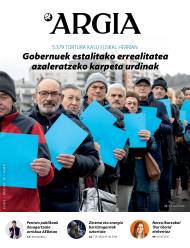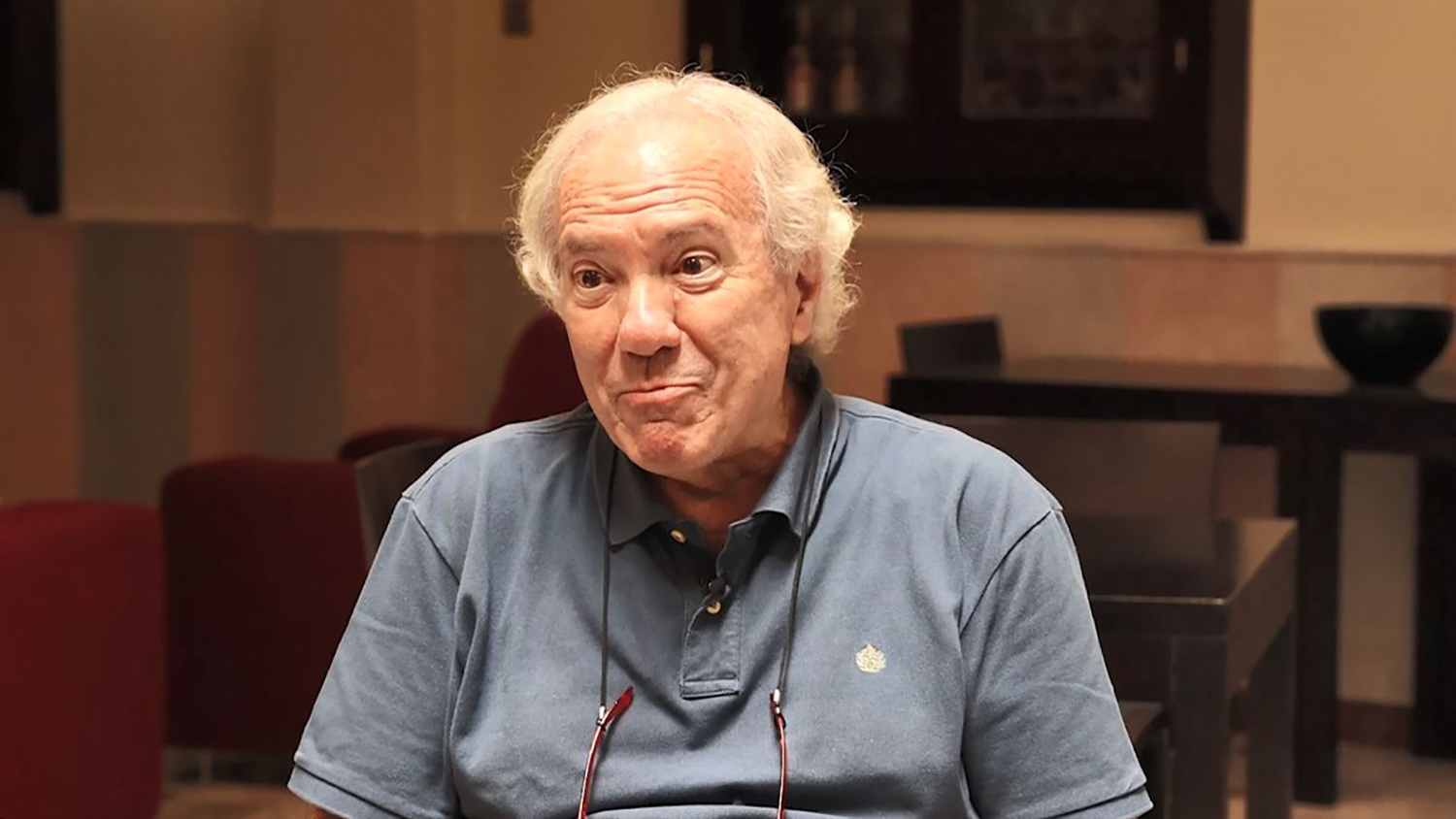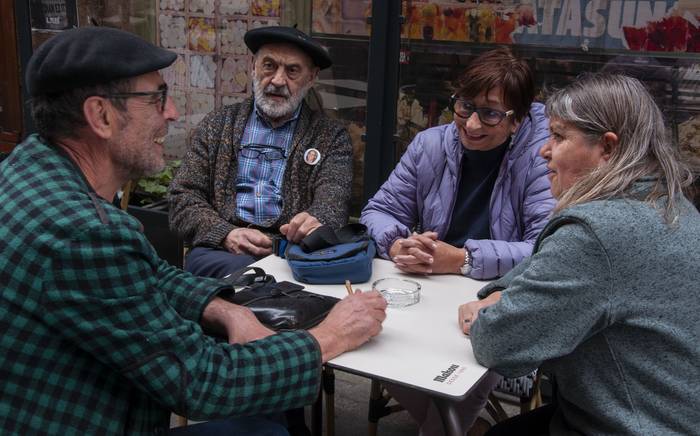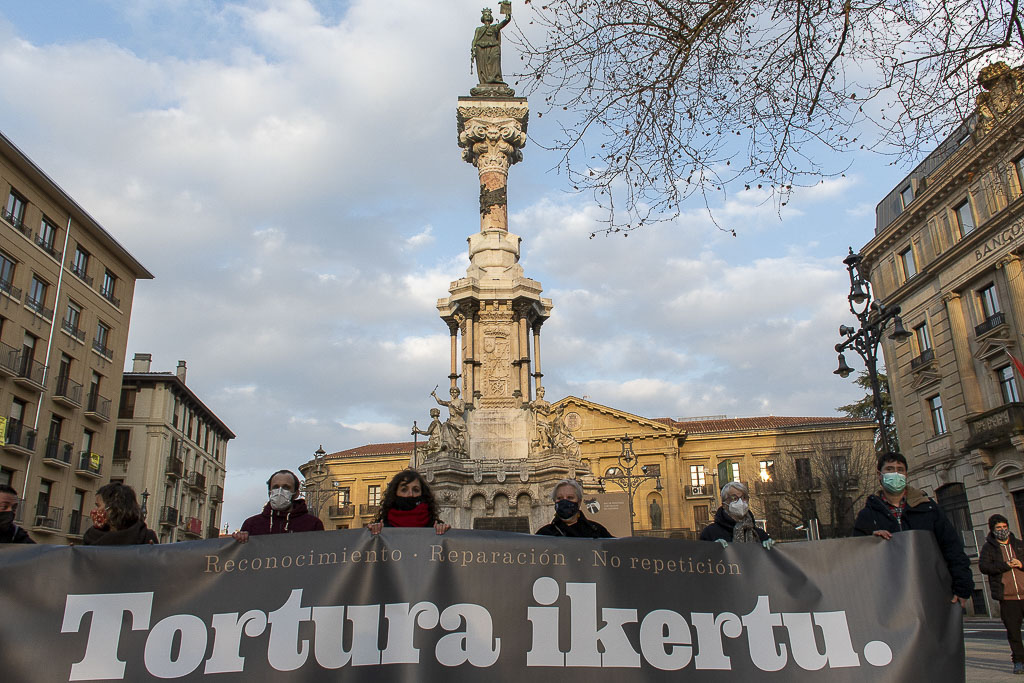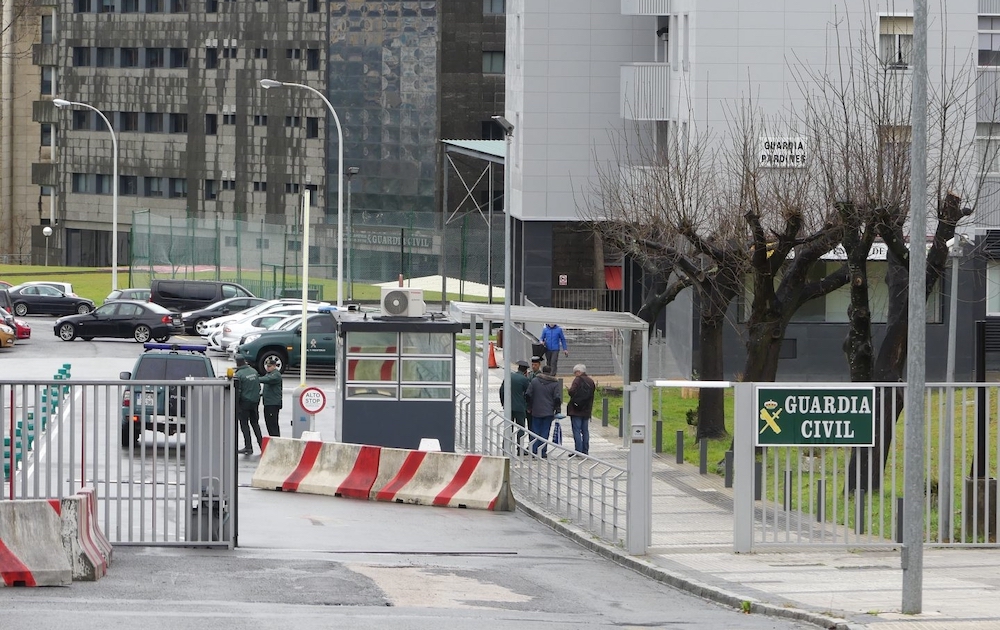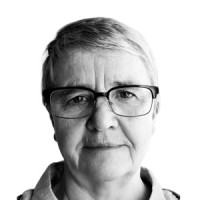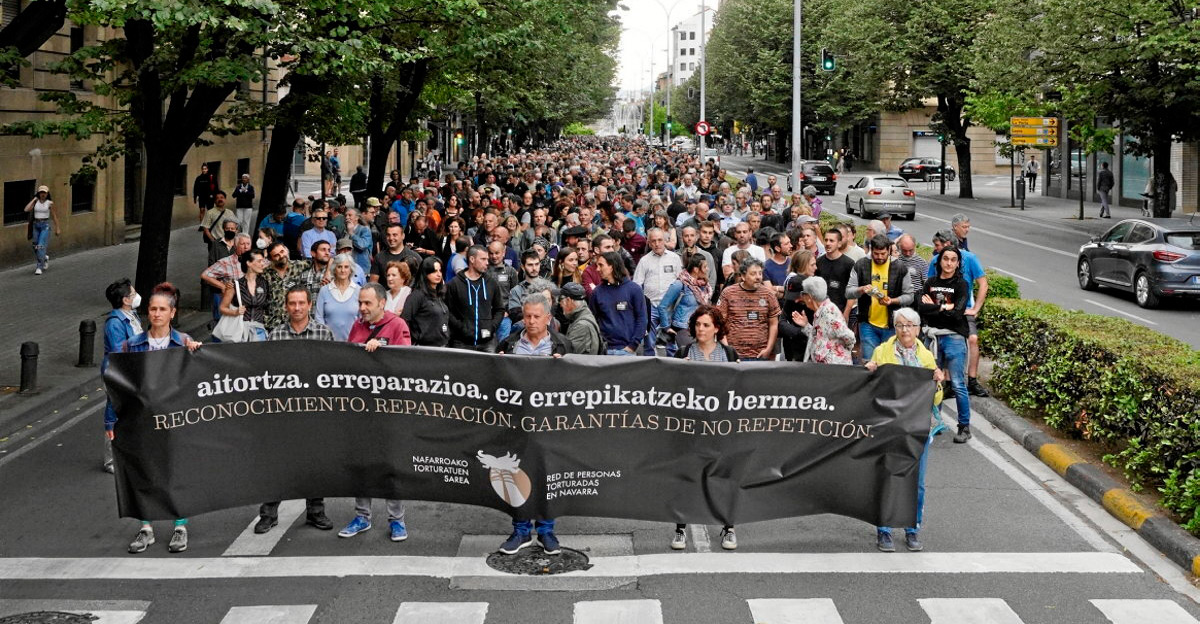The tortured call for truth, recognition and reparation to be maintained
- The Basque Institute of Criminology (KREI) presented on 9 January in Pamplona, commissioned by the Government of Navarra, a study on cases of torture between 1979 and 2015, with 532 cases of torture and 434 cases affected. The Institute continues to investigate and, according to the data it handles, provides for cases of torture to be around 825.

The full report of Navarra was presented on 7 February in the Parliament of Navarra, after the publication of this report. The general data presented here are similar to those presented in these lines. In 2019, the AICC presented cases of torture in the period 1960-1978, also on behalf of the Foral Government: 164 cases of torture were detected by 153 citizens (some were tortured two or more times). According to data from both studies, 1,068 cases of torture were obtained in Navarra.
On the basis of the collection of cases of torture being made from people to people, the Network of Torturados de Navarra has also quoted more than a thousand. The two AICRE studies were carried out on behalf of the Department of Citizen Relations, led by Ana Ollo, in the framework of the Foral Order for the recognition and reparation of victims politically motivated by the extreme right or public officials, as indicated in the presentation of the research.
The report by KREI for the Basque Government in 2016 presented 4,113 cases of torture in the CAPV, but the investigation has followed and in 2021 there are 4,311, that is, a total of 5,379 cases of torture in Hego Euskal Herria, in the period 1960-2015. The number coincides approximately with the one presented by the Basque Parliament in 2016, with 5,658 cases of torture. However, many torturers have not realised their torture, or many of them are dead, and researchers believe that the real figure will far exceed 10,000.
.jpg)
Joy and disappointment In the world of tortured people there are
two contradictory feelings around all this data. Firstly, the joy, because the torture that the Spanish State has denied over and over again is emerging, and because it is also dealing with a level of recognition, particularly of the Basque Government, and to a lesser extent of the Government of Navarra. There is no change in the Spanish Government: torture has been isolated from a few ruthless officials, and it has been tried and condemned when it has taken place.
On the one hand, the joy and disappointment within the tortured, because they see that the KREI report was presented publicly in 2017, and because little has yet been done with the investigation. Truth, justice, reparation and non-repetition are what must be guaranteed to the victims, but in this case the whole process against torture is only being left to the first point, the truth. It is not a little, but as the coordinator of the Egia Foundation, Ainara Esteran, says, “the report gives the opportunity to go all the way, but the institutions took it as a final step. Incommunication has not disappeared and all the instruments of torture that the State has used are there, ready to resume if necessary.” Ainara herself was also tortured in the 1990s when she was arrested by the Spanish police.
.jpg)
Ainara Gorostiaga, a member of the Tortured Network of
Navarra from town to town, fears what will happen next, but for the moment they are happy because “for the first time we have an X-ray of Navarra and official general data”. The network was created in 2019 and has since given visibility to torture in Navarra. From October to September, 101 municipalities of the Foral Community will present their motions on torture.
Presentations of the partnership are also being made in different villages and this is bringing many people together, including the tortured. The next 13 February will be Day against Torture, and the 11 tortured will have a special appearance in Donostia to ask for the investigation and full recognition of torture. Then, among other things, a popular visionary campaign of the documentary Blue Folders will be launched, with the aim of empowering and organizing tortured villages, as is being done in Navarra.
The Tortured Network has become a reference in Navarra: “We are with anyone, politicians, institutions, associations... no one personally denies us that we are tortured,” says Gorostiaga. The introduction of torture is gradually being achieved in some regions, but in others it is more complex. In the Pyrenees, for example, there are still people who have not talked about torture. To the torturado who wants to explain his case, he passes the form to complete with a series of data and, according to Gorostiaga, “it is not easy to complete them. It's hard, but at the same time it helps some to release the knot and then they thank it. In general, this strengthens us and over time we benefit. In the association, we deal with the theme of care”.
.jpg)
The torture of the Ertzaintza, according to the KREI study, has 336
cases of torture. Most of the torture attributed to the Ertzaintza occurred in the 1990s, and since 2000 the cases gradually declined. The strands of torture have been driven from Madrid, but their claws have reached Arkaute. And it is curious what is happening now, because the Basque Government says that KREI’s work is credible, but then denies that the Ertzaintza has tortured.
Iñigo Urkullu responded to the question asked by journalist Iñaki Iriondo in Gara newspaper in 2016: "Is it the same to have a person standing on a questionnaire as the practice of bags or electrodes? Is it the same? No, it is not.” According to the study, many of the ill-treatment of the Ertzaintza have to do with body posture – standing for a long time or forcing them to maintain inadequate postures for a long time – but they are threats, blows, deprivation of basic needs, humiliations or psychological torture, as can be read in the report.
In April 2018 the PP tabled a motion in the Basque Parliament to ask the government to withdraw the KREI report on torture, because if ETA was not being played. Parliament rejected the request. Parliamentarian Iñigo Iturrate supported the position of the PNV, but also said that the Ertzaintza took care of human rights, underlined that research and international institutions are challenging the Government of Spain and not the Basque Government.
.jpg)
The president of the Ertzaintza, Jorge Aldekoa, in an act of the Summer Courses of the UPV/EHU, denied the torture of the autonomous police in San Sebastian the day after presenting the findings of the investigation by the government and AICC in 2016. He praised the Ertzaintza protocol against mistreatment and said that he preferred not to make further assessment until the final report of the investigation.
The Institute continues its investigations, but the report submitted so far clearly states that the Ertzaintza has 336 cases of torture (page 154 of the report), the time of the cases (p. 156). or torture he used (184 p. ).
The report also speaks, quite rightly, of the protocol against the abuse of the Ertzaintza, but adds that this has not prevented any allegations of torture. Aldekoa highlighted this in Donostia’s act: “These are complaints.” Most Jeltzales authorities often make it clear that there has never been a judicial conviction against the Ertzaintza. Estefanía Beltrán de Heredia and Josu Erkoreka, former Security Advisor and current Security Advisor of the Basque Government, have made statements in this regard.
The recording of the questionnaires was among the guarantees of the Ertzaintza, for example, the recording of the questionnaires of incommunicado detainees. The Ombudsmen,
Xabier Markiegi and Mertxe Agúndez, in 1999 and 2000 respectively, recommended to the Ertzaintza the holding of these recordings in their annual report, but the Basque Police did not do so until 2006. In addition, as confirmed by the recently deceased PSE Interior Minister, Rodolfo Ares, in his position in 2009, the recorded material was not stored for more than three months, but the protocol required that it be kept for the time of prescription corresponding to the crime investigated.
For Ares, at the time of advisor Javier Balza, the recordings were not kept and he did not see it necessary either. In 2009 there was a great stir in the torture of nine young people detained by the Ertzaintza in Ondarroa. Ararteko requested tapes of questionnaires and the Ertzaintza did not give them to him or to a judge of the Durango Court who requested the recording. He argued that he did not have, that the recordings were erased three months, contrary to what the protocol requested.
It is never too late for recognition and truth, better before late and if possible when victims are alive. The Spanish Government apologized to the relatives of Juan Mañas, Luis Cobo and Luis Montero of the Almeria case on 20 January. The three young men were tortured and killed by the Civil Guard in Almería in 1981, after being confused with three ethnic groups. Three Civil Guards were sentenced, the leader spent ten years in prison, the other two subordinates left five on parole and gave them millions of pesetas from the state sewers to resume their lives after leaving prison and being expelled from the Civil Guard. The state that denies the torture of thousands of Basque citizens has asked for forgiveness from the relatives of the three young people, but 43 years later.
(The interview accompanying the director of the documentary Blue Folders, Ander Iriarte, has been published together with the report:
“The Government has 300 reasons for continuing the issue of torture: 300 cases of torture of the ertzaintza”
Felipe Gonzálezen garaian Espainiako Barne ministroa zen José Barrionuevoren aurkako kereila aurkeztuko dute, Ipar Euskal Herriko errefuxiatuen aurka abiatu zuen estrategiagatik. ZEN Zona Especial Norte Planaren barruan egindako ekintzen erantzule nagusietako bat... [+]
MARTA PIKAZA GARAIGORTA (Laudio, 1968) Euskal Herriko Torturatuen Sareko kideak eta eskualdeko beste torturatu batzuek ekin diote Aiaraldean ekimena antolatzeari. Egingo dituzten urratsak eta helburuak azaldu dituzte.
Euskal Herriko Bilgune Feministak deituta elkarretaratzea egin dute Hernanin Iratxe Sorzabali elkartasuna adierazi eta "babes osoa" emateko. Inkomunikatuta egon zen uneak berriz ere epailearen aurrean kontatu behar izatea, "bizi izandakoak utzitako ondorioen... [+]
For almost a century, there has been no generation in the Basque Country that has not known torture. There are 5,379 people officially since 1960, but there are many more, because appearing publicly as tortured still hurts. And probably because nothing has changed at the base... [+]
Otsailaren 13a Torturaren Kontrako eguna izanki, Euskal Herriko Torturaren Sareak gutun publiko bat igorri du. Poliziek torturatu euskal jendeen lekukotasunak bildu, eta aitortza egiteko xedea du sare berri horrek Euskal Herri osoan. Torturatuak izan diren 5.000 pertsonei... [+]
Jar gaitezen 2025erako proposamen politiko gisa, Espainiako Auzitegi Kolonialaren (AN) epai guztiak berrikusten hasteko eta makila bakoitzak bere belari eusteko.
Unionismoarekin lerrokatutako alderdi, sindikatu eta gizarte-erakunde gehienek, eta ez bakarrik horrela... [+]
This year marks the 51st anniversary of the United Nations proclamation of International Human Rights Day on 10 December. This date has become important in Euskal Herria and the Human Rights Observatory of Euskal Herria wants to offer some elements of reflection.
Progress on... [+]
In 2006, Baltasar Garzón, then star judge, suffered a kind of revelation and drafted a practice that guaranteed the rights of those detained for terrorism. The same judge saw hundreds of incommunicado detainees pass through his room, many with obvious signs of ill-treatment,... [+]
“In the newsletter today at noon, you will see the mayor of your capital, offering the main plaza of the city to the military body that tortured us. In today’s information at noon, you will see the structure that murdered our friends and relatives unravel through our... [+]
“In the newsletter today at noon, you will see the mayor of your capital, offering the main plaza of the city to the military body that tortured us. In today’s information at noon, you will see the structure that murdered our friends and relatives unravel through our... [+]









